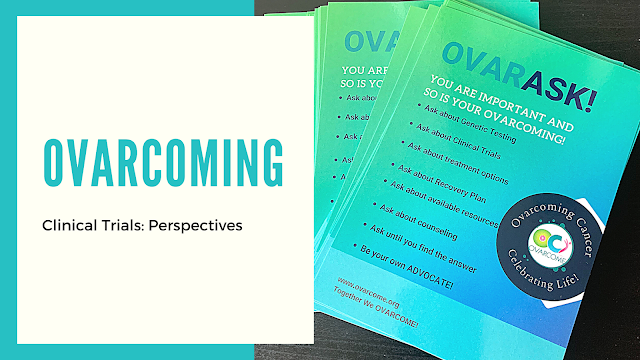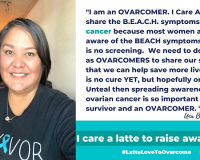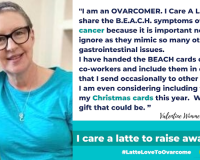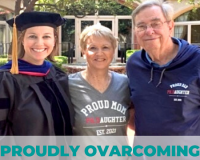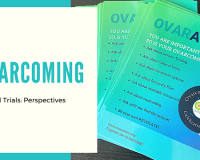Getting Candid With Clinical Trials
Research will ultimately cure cancer. As we approach Clinical Trials Awareness Day on May 20, we are excited to launch our WE ASK SCIENCE Series to raise clinical trial awareness worldwide.
What are clinical trials?
They are research studies designed to evaluate a medical, surgical, or behavioral intervention. It is the primary way by which researchers determine if a new treatment, like a new drug or diet or medical intervention device is safe and effective in people.
Clinical Trials initiate several questions.
How many of us know and understand it? What does it entail? Why should we consider it? What happens if it misses the mark? What are the challenges?
We asked our OVARCOMERS over the course of several months. We asked: “what does clinical trial mean to you?” We asked: “what would you like to share from your experience?”
We are sharing a snapshot of the candid conversations and feedback we have received. The comments below are aggregated feedback from several of our Ovarcomers -we thank them for the clarity and the candidness with which they shared their thoughts. THIS is how we Ovarcome Together!
Many of these comments will be addressed by our Physicians in the upcoming series: We Ask Science: Connect Ovar Coffee. Stay tuned!
From the desk of an Ovarcomer: Perspectives on Clinical Trials
What is said: you may be the first to benefit from a carefully considered new treatment and you may be able to help future cancer patients.
What I say (OVARCOMER): Agree.
What is said: Trials are safe and you can quit the trial at any time.
What I say: Each trial comes with side effects and your own personal side effects may or may not fit in with the algorithm for changing the protocol in any way. You have to have your own parameters for knowing if you want to continue or not. Review the side effects carefully. Do not feel like you need to make a decision on enrolling in a trial the same day. Give yourself enough time to evaluate
If your protocol changes be sure you know what you can and cannot do by talking to your trial contact. (For example, start, stop or adjust doses to other medications that may be given to help with side effects.)
What is said: There is eligibility criteria used to determine if you can participate in a trial.
What I say: Completing the necessary eligibility testing to determine if you can participate can take weeks or longer which is something to consider. Also getting insurance to review and accept can take time before you can start the eligibility testing and the trial itself. Some trials have a “wash out” period where you have to wait to let medications leave your system before you begin new medications. This can also add to the delay in starting a trial.
What is said: Trials can include increased surveillance in the form of more visits, more lab work, more scans or biopsies, i.e. they watch you more closely.
What I say: There are definitely larger time and logistical commitments with trials. These commitments may increase even more than the standard protocol if side effects are not tolerable. This can include many more phone calls, trips to the doctor, for lab work or for scans. There are set check ups for trials but you need to be willing and able to communicate and ask for guidance if you have side effects and/or questions outside of those set time
What is said: Trials include increased communication with a research team.
What I say: This will be a new team and contact which you may not have worked with before, you need to be OK with it. Every trial is designed differently, but it is possible you will not see your regular doctor during your time on the trial, but see your Trial doctor instead
What is said: If disease isn’t controlled on a trial the doctor will stop your participation and may offer another treatment option.
What I say: This is correct but it is based on a set timeline for each particular trial. You need to be okay with waiting sometimes months to know if the trial is working or not before your next bloodwork and/or scan determine whether or not you can continue on the trial.
The time on a trial between check ups can be challenging especially if you are experiencing side effects. Ask your Clinical Trials team about side effects experienced by others on the trial (if any), if treatments had to be altered or halted for any participant, or any other pressing questions on your mind.
What is said: The cost of the trial may be covered by drug companies and insurance.
What I say: You need to do your own homework and be sure – many costs are not covered, and you could be billed for them. For example, costs can include not just the drugs but administration, labs, scans, etc. With the increased testing and visits that also includes the need to pay for more parking, pay for more drinks or meals during long days of waiting and/or testing, pay for more for gas and tolls to and from your cancer center, etc.
When we asked our OVARCOMERS what they think of Clinical Trials and if they have considered enrolling in Clinical Trials, we received the following answers:
“At one time I did but then I just lost interest.”
“How do you go about doing that?”
“Different options.”
“Unfortunately I did not qualify for the one I wanted to do right now”
“It has never been presented as an option by my healthcare team”
“No, I never have heard of Clinical Trials”
“Clinical trials mean that they are good for certain people”
“ I would I do it, if I knew it would be successful”
“Long term you never know what’s going to happen.”
“If there was a clinical trial that had potential benefit I want, I would consider it.”
“Well I really haven’t been in any but I would support them.”
“I think they’re great. These are opportunities, to find cures for cancer”
“Obviously it’s a good thing or I wouldn’t have this medicine now. I definitely believe in clinical trials, yes.”
“Hope. If people didn’t participate in clinical trials we wouldn’t have the medicines that are out there today that we’re being treated with.”
“I would if my doctor recommended, but we have not had that discussion yet”
“I would love to be part of a clinical trial, they mean a lot to me, they mean to me that there is advancement and there is hope for the type of cancer that I’m diagnosed with”
“I never really thought or looked into that to be honest I’m just kinda dumfounded by it all”
Stay tuned for our WE ASK SCIENCE sub-series on Connect Ovar Coffee – starting April 27! If you have any comments or feedback on this topic, we would love to hear from you.
Together We Learn. Together We Ovarcome!

